|
|

|
Porsche, and the Porsche crest are registered trademarks of Dr. Ing. h.c. F. Porsche AG.
This site is not affiliated with Porsche in any way. Its only purpose is to provide an online forum for car enthusiasts. All other trademarks are property of their respective owners. |
|
|
  |
| Superhawk996 |
 Mar 30 2025, 05:50 PM Mar 30 2025, 05:50 PM
Post
#101
|
|
914 Guru      Group: Members Posts: 7,594 Joined: 25-August 18 From: Woods of N. Idaho Member No.: 22,428 Region Association: Galt's Gulch 
|
That oil seemed to heat up pretty quick. Makes me think there is still a timing issue. My oil won't hit 220 unless I am really giving it the beans and it's hot outside. 220 is fine of course. Was it hot down there today (IMG:style_emoticons/default/agree.gif) though I’d suspect the oil cooler more than timing. Take a very close look at your flaps and whether the top of your oil cooler is clear - think you mentioned you have a borescope? Not at all uncommon for leaves, cottonwood fluff, maple tree helecopter seeds, and rodent stuff to block the oil cooler - doesn’t take much to really restrict airflow across it. Can’t tell easily just by looking at the bottom of the cooler. The oil temp sensor in the oil sump (ie the taco plate) is a thermistor and is accurate. The OEM sensor is a 200C sensor. Sometimes they get swapped with the wrong sensor which changes the gauge calibration. Verify you have the proper sensor and see the graphic below for how the wrong sensor (120C or 150C) affects the calibration. 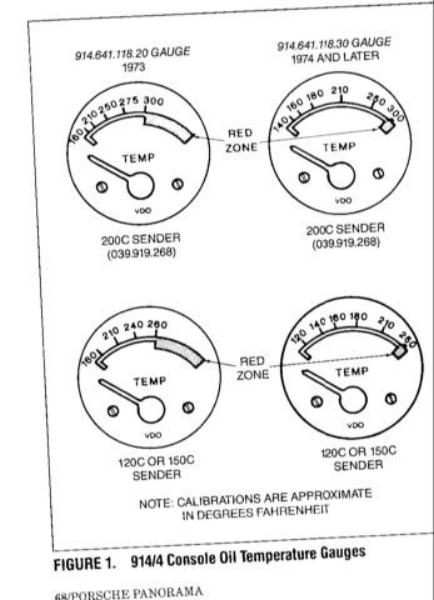 |
| Superhawk996 |
 Mar 30 2025, 05:55 PM Mar 30 2025, 05:55 PM
Post
#102
|
|
914 Guru      Group: Members Posts: 7,594 Joined: 25-August 18 From: Woods of N. Idaho Member No.: 22,428 Region Association: Galt's Gulch 
|
This happened to be a 911 cooler on an engine I tore down, but I’ve seen the same type obstructions on 914s.
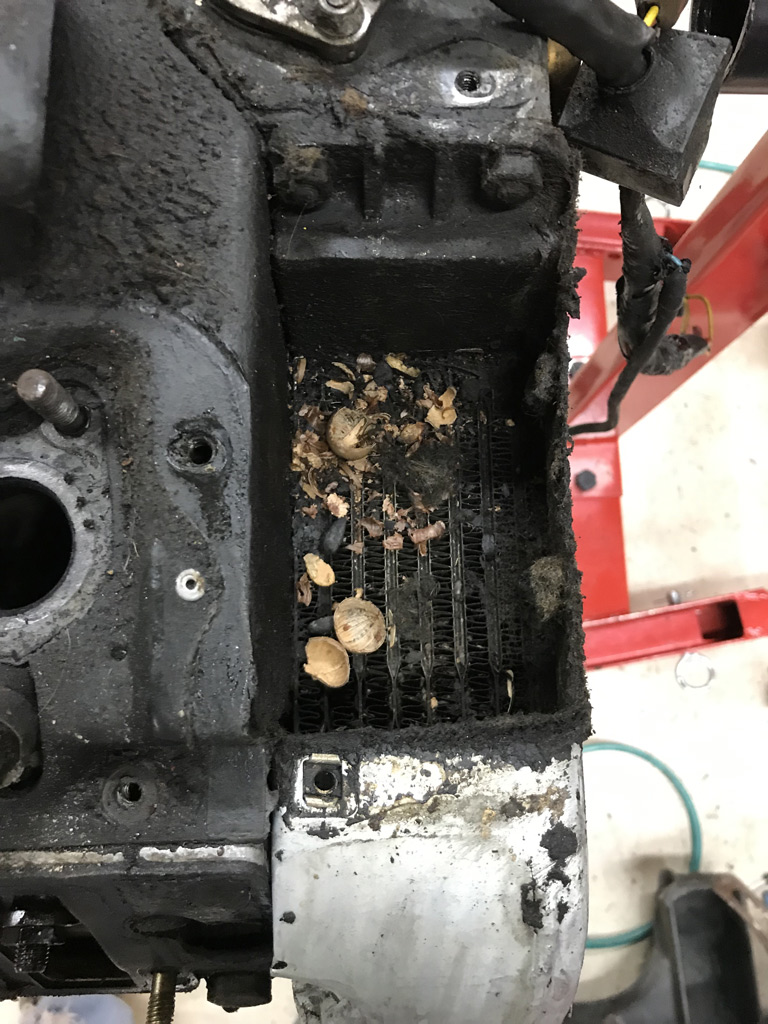 A sure fire ticket to elevated oil temps. Worth investigating because you also had some unexplained oil residue on that plug picture on the 1st page. Oil misting and leakage anywhere around the oil cooler attracts crap like a magnet. |
| Superhawk996 |
 Mar 30 2025, 05:59 PM Mar 30 2025, 05:59 PM
Post
#103
|
|
914 Guru      Group: Members Posts: 7,594 Joined: 25-August 18 From: Woods of N. Idaho Member No.: 22,428 Region Association: Galt's Gulch 
|
Shows how your flaps work and why they are mandatory. Without the flap on the 3/4 side, air will bypass the cooler completely.
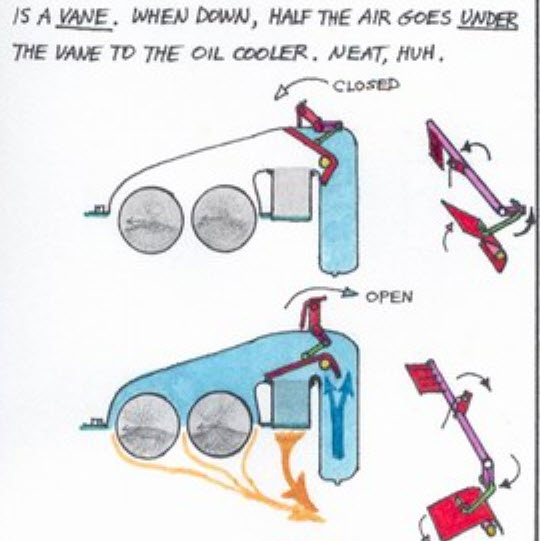 |
| Superhawk996 |
 Mar 30 2025, 06:11 PM Mar 30 2025, 06:11 PM
Post
#104
|
|
914 Guru      Group: Members Posts: 7,594 Joined: 25-August 18 From: Woods of N. Idaho Member No.: 22,428 Region Association: Galt's Gulch 
|
I've been told not to trust the calibration on the VDO gauges. The CHTs are thermocouples, so that is pretty simple and generally dead accurate. Not sure who’s telling you this but: VDO were some of the best gauges in the world at the time our cars were made. Your speedo and tach are VDO. Would you say the same of those? Though thermocouple sensors are dead simple, it’s actually the VDO cylinder temp gauges that have the most inaccuracy. VDO cylinder temp gauges do not have a temperature compensated cold junction and their accuracy varies depending on the temperature of the gage itself in the vehicle cabin. I won’t cover the details of why but suffice to say, there are more accurate cylinder temp gauges on the market (Dakota digital) that do have a temperature compensated cold junction and are more accurate than the VDO cylinder temp gauges. Though the thermocouple sensor is dead simple, reading thermocouples is more complicated than a thermistor and subject to more error if the cold end isn’t compensated. The OEM VDO oil temp gauge sensor is a thermistor and isn’t subject to the same inaccuracy as the cylinder temp gauges fed by thermocouples. |
| Blue Lightning |
 Mar 31 2025, 02:22 PM Mar 31 2025, 02:22 PM
Post
#105
|
|
Member   Group: Members Posts: 77 Joined: 7-December 23 From: Atlanta, GA, USA Member No.: 27,780 Region Association: South East States |
|
| Blue Lightning |
 Mar 31 2025, 02:30 PM Mar 31 2025, 02:30 PM
Post
#106
|
|
Member   Group: Members Posts: 77 Joined: 7-December 23 From: Atlanta, GA, USA Member No.: 27,780 Region Association: South East States |
Take a very close look at your flaps and whether the top of your oil cooler is clear - think you mentioned you have a borescope? Not at all uncommon for leaves, cottonwood fluff, maple tree helecopter seeds, and rodent stuff to block the oil cooler - doesn’t take much to really restrict airflow across it. Can’t tell easily just by looking at the bottom of the cooler. The oil temp sensor in the oil sump (ie the taco plate) is a thermistor and is accurate. The OEM sensor is a 200C sensor. Sometimes they get swapped with the wrong sensor which changes the gauge calibration. Verify you have the proper sensor and see the graphic below for how the wrong sensor (120C or 150C) affects the calibration. I replaced the sensor with this VDO one (https://www.autoatlanta.com/Porsche-Sending-Unit-For-Aftermarket-Vdo-Oil-Temperature-Gauge-Parts-PN-RVDO323055.html), along with the appropriate gauge in the console (VDO 310-94300). So that is what the numbers I had reported were from. Good idea on checking the oil cooler. I hadn't thought of that. Wouldn't be surprised if there was another paper towel in there (IMG:style_emoticons/default/smile.gif) |
| Blue Lightning |
 Mar 31 2025, 02:49 PM Mar 31 2025, 02:49 PM
Post
#107
|
|
Member   Group: Members Posts: 77 Joined: 7-December 23 From: Atlanta, GA, USA Member No.: 27,780 Region Association: South East States |
Not sure who’s telling you this but: VDO were some of the best gauges in the world at the time our cars were made. Your speedo and tach are VDO. Would you say the same of those? Though thermocouple sensors are dead simple, it’s actually the VDO cylinder temp gauges that have the most inaccuracy. VDO cylinder temp gauges do not have a temperature compensated cold junction and their accuracy varies depending on the temperature of the gage itself in the vehicle cabin. I won’t cover the details of why but suffice to say, there are more accurate cylinder temp gauges on the market (Dakota digital) that do have a temperature compensated cold junction and are more accurate than the VDO cylinder temp gauges. Though the thermocouple sensor is dead simple, reading thermocouples is more complicated than a thermistor and subject to more error if the cold end isn’t compensated. The OEM VDO oil temp gauge sensor is a thermistor and isn’t subject to the same inaccuracy as the cylinder temp gauges fed by thermocouples. The VDO complaint I saw (apparently with data) was at https://www.thesamba.com/vw/forum/archive/i...t-618759--.html, though I was unable to find a copy of the Wolksworld article that was referenced. Not dissing on VDO in particular. My tach is surprisingly accurate and responsive. My speedometer, though, was not (before replacing the cable, it was at least 10% off and bouncy; haven't checked since replacement). It's just 1960's technology. The measurement technique hasn't changed, but the technology to create the components has improved. I mostly have autometer gauges in my other cars and really like their mechanical ones, but their servo motor ones are loud. I don't like that the VDO pressure senders need a case ground and VDO does not provide a lug to do so when the sender is not hard-mounted. None of the manufacturers are perfect. The CHT is one of the aircraft/swift (China) ones. A friend of mine with a Corvair pointed me to them. It's uncompensated, though I did run thermocouple wire all the way to the gauge so the cold junction is in the cockpit instead of the engine bay (IMG:style_emoticons/default/smile.gif) Thermistors and thermocouples are both nonlinear devices, so depends on whether you want to measure voltage or resistance? (IMG:style_emoticons/default/confused24.gif) |
| Blue Lightning |
 Mar 31 2025, 05:40 PM Mar 31 2025, 05:40 PM
Post
#108
|
|
Member   Group: Members Posts: 77 Joined: 7-December 23 From: Atlanta, GA, USA Member No.: 27,780 Region Association: South East States |
Challenging assumptions...checking that I have the correct location for the timing marks on the fan.
Picture is of the flywheel mark viewed from above the engine, which I used to find TDC on the fan. I then moved to the fan. This video is using the endoscope to watch the engine-side fan notch, where I moved the car from 1 fan blade before TDC to 1 fan blade after: https://youtu.be/brFEP860nuU I then went ahead to 27 degrees BTDC, where I can see the actual red scribe mark in the fan, and rotate the fan forward the ~10 blades to the next cross-support piece: https://youtu.be/JCrEegzUfGg The 27 deg BTDC is clearly marked. However in neither of the videos is there a "0" mark for TDC. How common is it for the 0 not to be marked? Attached thumbnail(s) 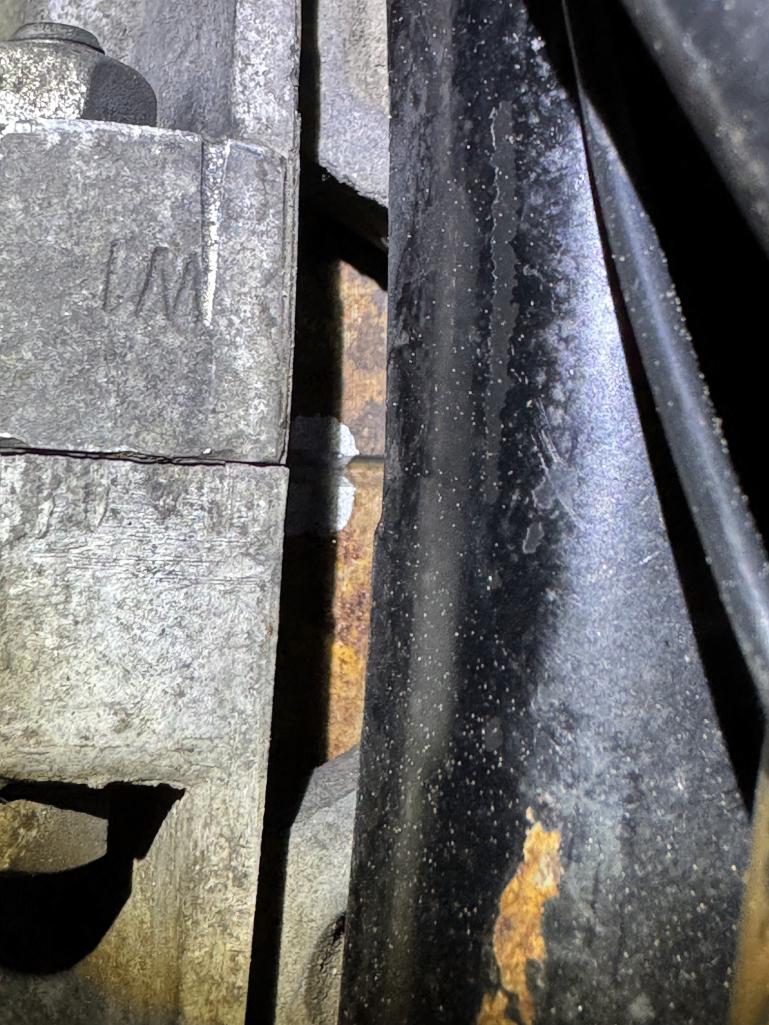
|
| Superhawk996 |
 Mar 31 2025, 06:38 PM Mar 31 2025, 06:38 PM
Post
#109
|
|
914 Guru      Group: Members Posts: 7,594 Joined: 25-August 18 From: Woods of N. Idaho Member No.: 22,428 Region Association: Galt's Gulch 
|
I replaced the sensor with this VDO one (https://www.autoatlanta.com/Porsche-Sending-Unit-For-Aftermarket-Vdo-Oil-Temperature-Gauge-Parts-PN-RVDO323055.html), along with the appropriate gauge in the console (VDO 310-94300). So that is what the numbers I had reported were from. Ugh (IMG:style_emoticons/default/headbang.gif) same crap from AA selling incorrect parts. In future post WTB and get the proper sensor. Sure it technically works but of course no mention on their website about how it shifts the gauge calibration. That sensor is the 150C sensor instead of OEM 200C Your gauge will consistently be reading high with the 150C sensor. Calibration for the 150C sensor circled Let’s pick about 260F as a random reference. Rather than being mid scale and well away from the red zone as it would be with a 200C sensor (highlighted yellow), your gauge will now be right up on the red zone . (Sorry - not able to accurately place the 260 red line via my phone but I think you get the point) Sorry I picked the early gauge as the example - but you’ll see the same calibration shift occurs with the late oil temp gauge. So the good news is that you’re not running quite as hot as you think. Attached thumbnail(s) 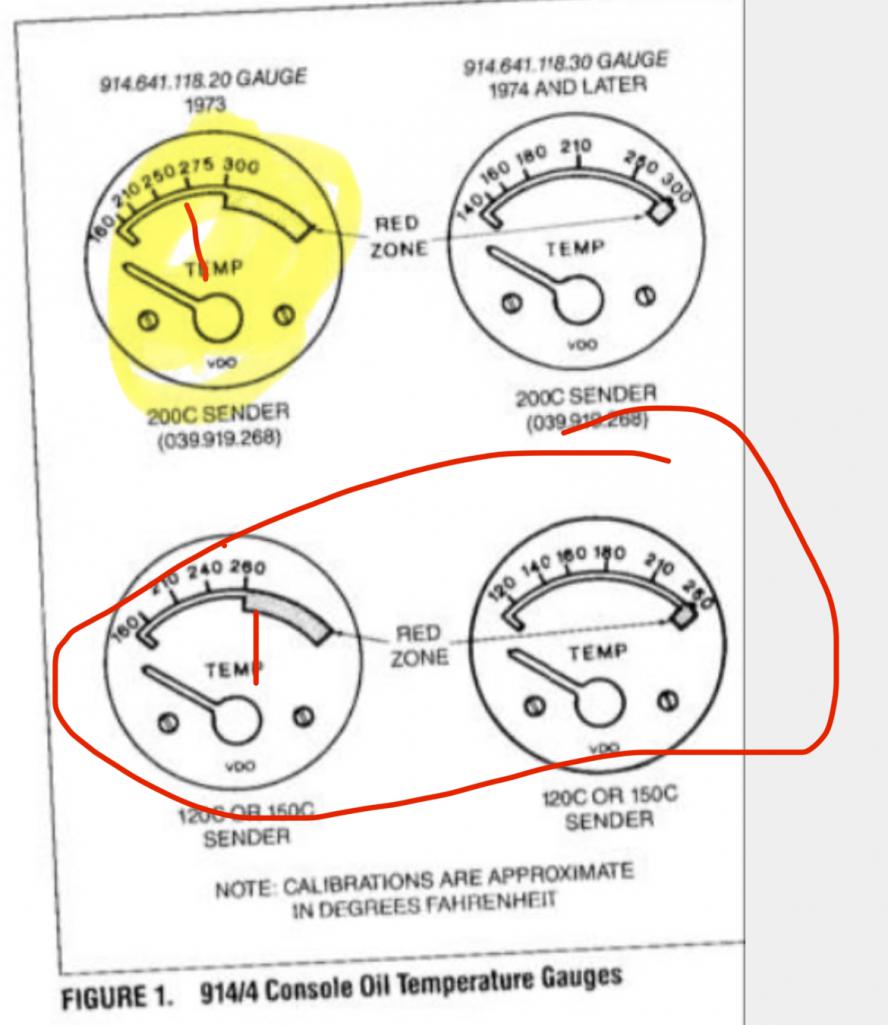
|
| Blue Lightning |
 Mar 31 2025, 07:00 PM Mar 31 2025, 07:00 PM
Post
#110
|
|
Member   Group: Members Posts: 77 Joined: 7-December 23 From: Atlanta, GA, USA Member No.: 27,780 Region Association: South East States |
I replaced the sensor with this VDO one (https://www.autoatlanta.com/Porsche-Sending-Unit-For-Aftermarket-Vdo-Oil-Temperature-Gauge-Parts-PN-RVDO323055.html), along with the appropriate gauge in the console (VDO 310-94300). So that is what the numbers I had reported were from. Ugh (IMG:style_emoticons/default/headbang.gif) same crap from AA selling incorrect parts. In future post WTB and get the proper sensor. Sure it technically works but of course no mention on their website about how it shifts the gauge calibration. That sensor is the 150C sensor instead of OEM 200C Your gauge will consistently be reading high with the 150C sensor. Calibration for the 150C sensor circled Let’s pick about 260F as a random reference. Rather than being mid scale and well away from the red zone as it would be with a 200C sensor (highlighted yellow), your gauge will now be right up on the red zone . Sorry I picked the early gauge as the example - but you’ll see the same calibration shift occurs with the late oil temp gauge. So the good news is that you’re not running quite as hot as you think. Just to be clear: The sender I have is VDO 323-055 (https://vdo-instruments.com/product/300f-150c-m14x1-5/). The gauge I have is VDO 310-94300 (https://vdo-instruments.com/product/cockpit-international-gen-ii-300f-150c-water-temperature-gauge-use-with-322-18-ohm-temperature-sender/) Both are listed as 300F parts. The original factory gauge and sender are no longer in the car (they are in a box in the basement). I agree that the 200C sensor with a 150C gauge is going to be...different. Did I miss something else? Attached thumbnail(s) 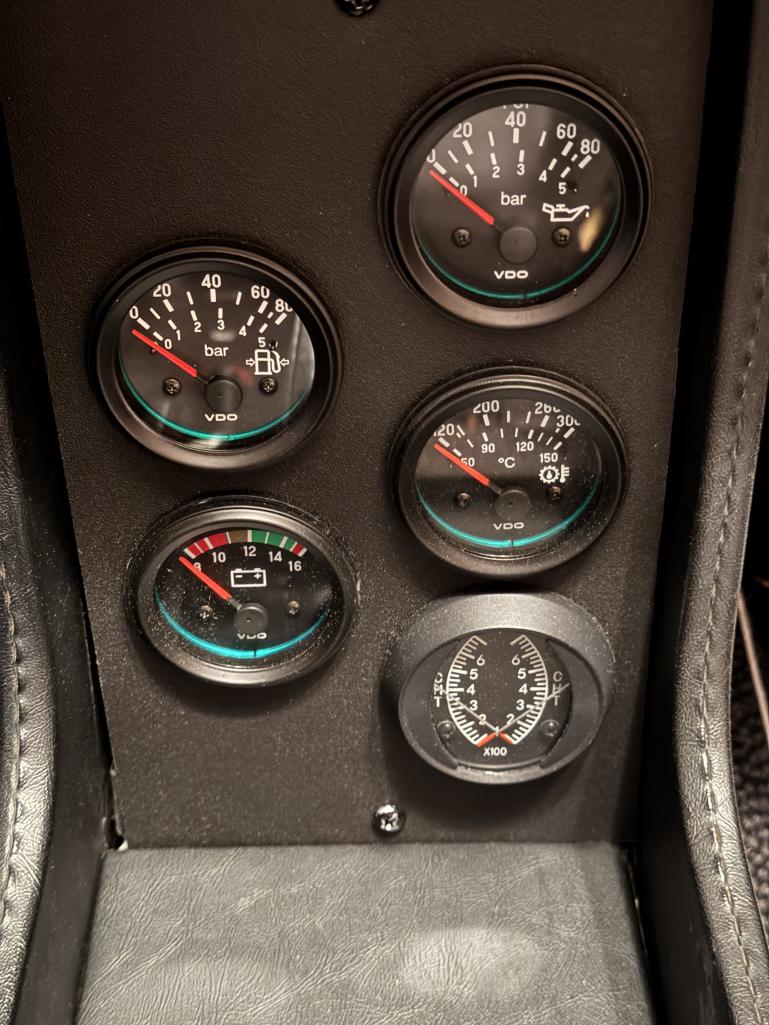
|
| Superhawk996 |
 Mar 31 2025, 07:10 PM Mar 31 2025, 07:10 PM
Post
#111
|
|
914 Guru      Group: Members Posts: 7,594 Joined: 25-August 18 From: Woods of N. Idaho Member No.: 22,428 Region Association: Galt's Gulch 
|
Ah. . . . I thought only the CHT was aftermarket. Completely misunderstood on my part (IMG:style_emoticons/default/headbang.gif)
My bad for badmouthing AA. Sorry! |
| Blue Lightning |
 Apr 1 2025, 04:30 AM Apr 1 2025, 04:30 AM
Post
#112
|
|
Member   Group: Members Posts: 77 Joined: 7-December 23 From: Atlanta, GA, USA Member No.: 27,780 Region Association: South East States |
Ah. . . . I thought only the CHT was aftermarket. Completely misunderstood on my part (IMG:style_emoticons/default/headbang.gif) My bad for badmouthing AA. Sorry! (IMG:style_emoticons/default/beerchug.gif) If the temp gauge in the car looked anything like the ones in your image above, I would probably have kept it. But as is, it isn't much better than an idiot light without markings on it. I didn't buy any of the gauges from AA -- was just a convenient link. Most came from amazon. I appreciate that AA has a lot of rare parts and George has a lot of knowledge, but I appreciate my wallet not being that light, either. If the prices are competitive I'll "shop local" and being local can be convenient if I'm missing something I want/need today, but my wife already complains enough that the car found my credit card (again). Attached thumbnail(s) 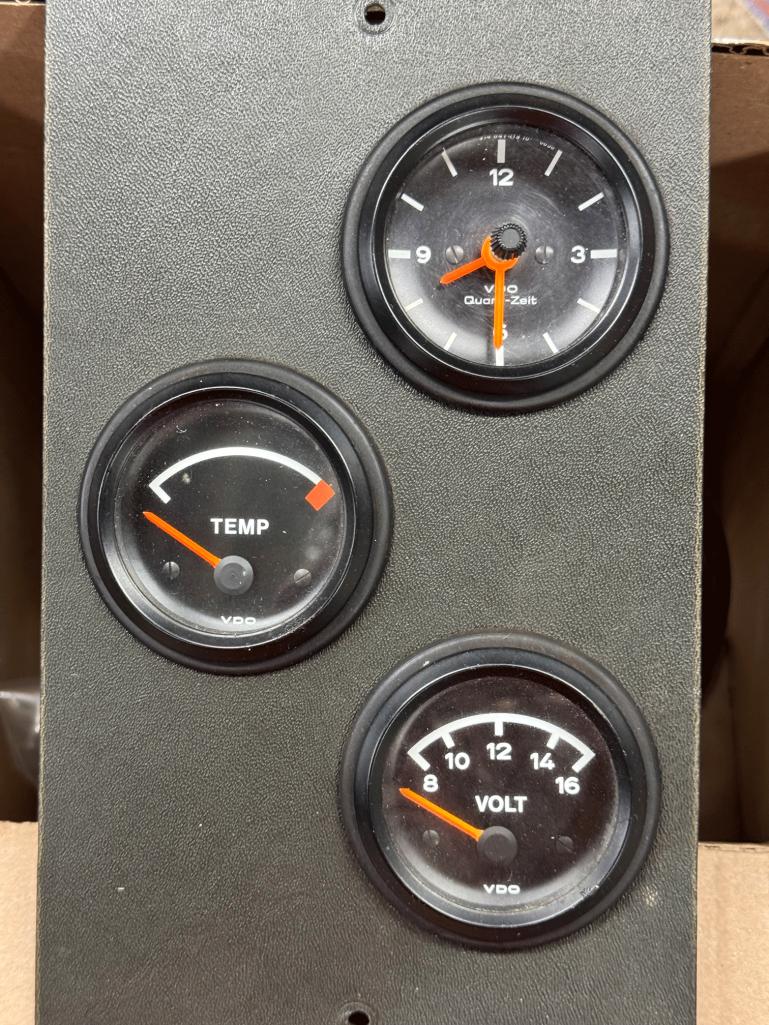
|
| Ron914 |
 Apr 1 2025, 07:06 AM Apr 1 2025, 07:06 AM
Post
#113
|
|
Member   Group: Members Posts: 476 Joined: 19-April 22 From: Huntington Beach,Ca Member No.: 26,487 Region Association: Southern California 
|
Ah. . . . I thought only the CHT was aftermarket. Completely misunderstood on my part (IMG:style_emoticons/default/headbang.gif) My bad for badmouthing AA. Sorry! (IMG:style_emoticons/default/beerchug.gif) If the temp gauge in the car looked anything like the ones in your image above, I would probably have kept it. But as is, it isn't much better than an idiot light without markings on it. I didn't buy any of the gauges from AA -- was just a convenient link. Most came from amazon. I appreciate that AA has a lot of rare parts and George has a lot of knowledge, but I appreciate my wallet not being that light, either. If the prices are competitive I'll "shop local" and being local can be convenient if I'm missing something I want/need today, but my wife already complains enough that the car found my credit card (again). (IMG:style_emoticons/default/agree.gif) |
| Superhawk996 |
 Apr 1 2025, 07:27 AM Apr 1 2025, 07:27 AM
Post
#114
|
|
914 Guru      Group: Members Posts: 7,594 Joined: 25-August 18 From: Woods of N. Idaho Member No.: 22,428 Region Association: Galt's Gulch 
|
You guys are funny.
Let me offer a point of view: These gauges were way ahead of their time. Most people have no idea what the numbers are or what they mean anyway. Many modern cars don’t even have gauges anymore. A different conversation but fact none the less related to Porsche’s logic of why not to number the scale and to just offer a red danger zone. Much better than an idiot light because the gauge is functional and can easily be used to monitor the trend which is all any gauge really does when you get down to brass tacks. What is the ideal oil temp in an aircooled engine? How do you deal with customers that think that water cooled and air/oil cooled engines should be running the same oil temperature? Likewise the early oil temp gauges in the 911 didn’t have numbers either. 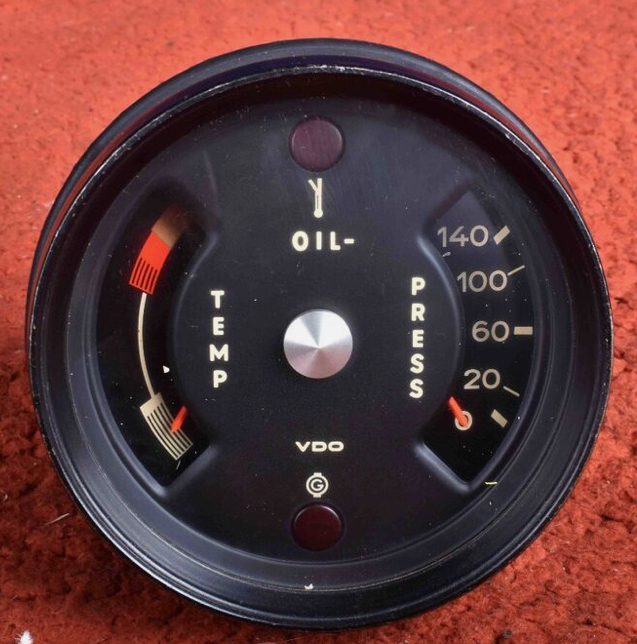 Do you need numbers on an analog clock to be able to tell time? Unfortunately there are now a number of Gen Z that can’t but that’s a whole different problem. (IMG:style_emoticons/default/happy11.gif) I don’t begrudge anyone that prefers numbers. Most enthusiasts do. |
| Blue Lightning |
 Apr 5 2025, 05:43 PM Apr 5 2025, 05:43 PM
Post
#115
|
|
Member   Group: Members Posts: 77 Joined: 7-December 23 From: Atlanta, GA, USA Member No.: 27,780 Region Association: South East States |
Good progress today. I replaced the coil with a new one (Pertronix 3 ohm) and installed a new distributor (123Ignition), and the car started right up, idled (dare I say) well. Let it run for about 10-15 minutes while we set the timing, then took it for a ~8 mile drive and all was good except now getting some backfires.
Attached image is after the drive. Oil temp under 220 looks good. A wire on one of the CHTs has apparently come loose, but the other one looks good, too. From what I have seen in the forums, backfiring implies an exhaust leak? Which is definitely possible... Attached thumbnail(s) 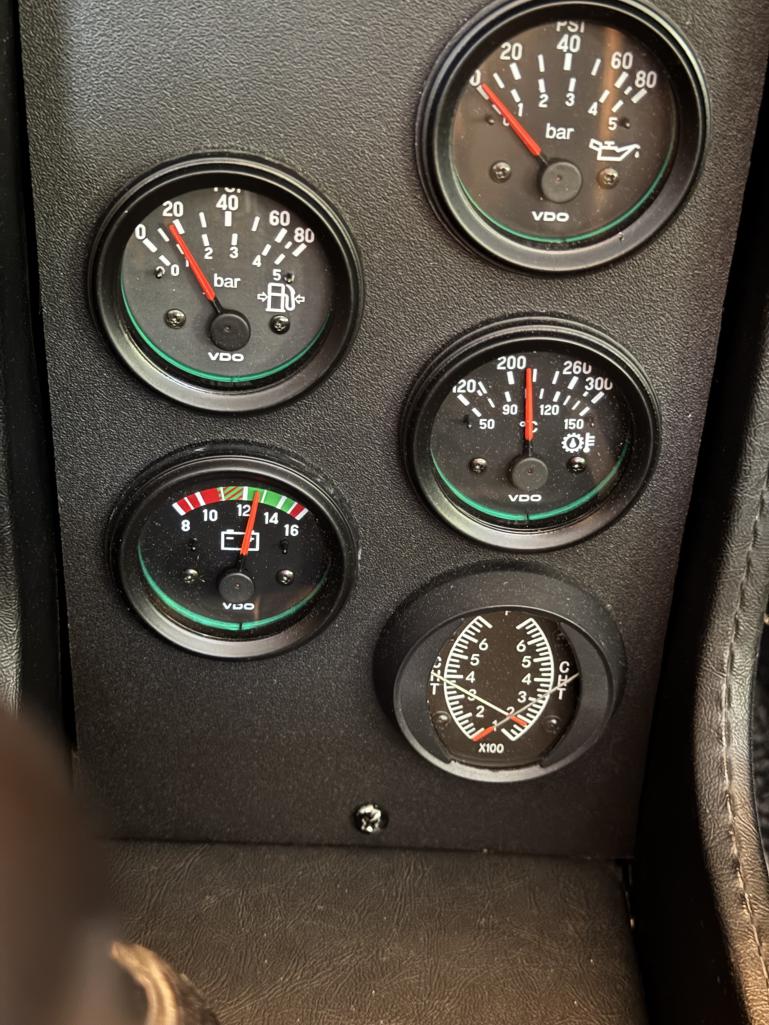
|
| emerygt350 |
 Apr 5 2025, 09:42 PM Apr 5 2025, 09:42 PM
Post
#116
|
|
Advanced Member     Group: Members Posts: 3,424 Joined: 20-July 21 From: Upstate, NY Member No.: 25,740 Region Association: North East States |
Out of curiosity, how hot did the cylinder head get? And it seems a little suspect that it would start back firing after it gets good and warm. An exhaust leak should be causing issues from cold.
Nice to see the coil and 123 all went in easily. |
| Blue Lightning |
 Apr 6 2025, 10:05 AM Apr 6 2025, 10:05 AM
Post
#117
|
|
Member   Group: Members Posts: 77 Joined: 7-December 23 From: Atlanta, GA, USA Member No.: 27,780 Region Association: South East States |
Out of curiosity, how hot did the cylinder head get? And it seems a little suspect that it would start back firing after it gets good and warm. An exhaust leak should be causing issues from cold. The CHT says under 200F, which doesn't seem like it could be hot enough based upon Raby's guide (http://www.914world.com/specs/JakeRabyHeadTemps.php). The backfiring/hesitation increased as the temperature increased. Do you think I need to revisit the valves again? |
| Superhawk996 |
 Apr 6 2025, 10:13 AM Apr 6 2025, 10:13 AM
Post
#118
|
|
914 Guru      Group: Members Posts: 7,594 Joined: 25-August 18 From: Woods of N. Idaho Member No.: 22,428 Region Association: Galt's Gulch 
|
The CHT says under 200F, which doesn't seem like it could be hot enough based upon Raby's guide (http://www.914world.com/specs/JakeRabyHeadTemps.php). The backfiring/hesitation increased as the temperature increased. Do you think I need to revisit the valves again? Make sure you’re using the proper thermocouple type. Likely k-type but I’m not familiar with that gauge. Idle time and an 8 mile drive without heavy load like hills and WOT, isn’t going to get heads terribly hot if all is working well and the engine is properly tuned. However it is odd that your head temps would be low and the oil temp would be so high that quickly. Oil temps usually lag head temps by 5-10 minutes since there is the whole thermal mass of the oil and the case that need to be heated. Did you inspect the top of the oil cooler yet? Yes, if backfiring is getting worse as it warms revisit valves. There should only be the most minimal of perceived drag on the feeler gauge when doing the adjustment. If you’re not very careful the adjustment changes when tightening the jam nut and sometimes you need to sort of adjust a smidge loose to anticipate the change that occurs when the nut is tightened. Verify again when tightened. |
| Superhawk996 |
 Apr 6 2025, 10:23 AM Apr 6 2025, 10:23 AM
Post
#119
|
|
914 Guru      Group: Members Posts: 7,594 Joined: 25-August 18 From: Woods of N. Idaho Member No.: 22,428 Region Association: Galt's Gulch 
|
I posted picture of the flaps for 3/4 side but I don’t see that it has ever been confirmed — does your engine have the flaps in place?
|
| emerygt350 |
 Apr 6 2025, 02:56 PM Apr 6 2025, 02:56 PM
Post
#120
|
|
Advanced Member     Group: Members Posts: 3,424 Joined: 20-July 21 From: Upstate, NY Member No.: 25,740 Region Association: North East States |
I agree with hawk. Until you know more, I wouldn't trust that cht or oil temp.
|
  |
1 User(s) are reading this topic (1 Guests and 0 Anonymous Users)
0 Members:

|
Lo-Fi Version | Time is now: 21st December 2025 - 03:21 AM |
Invision Power Board
v9.1.4 © 2025 IPS, Inc.








